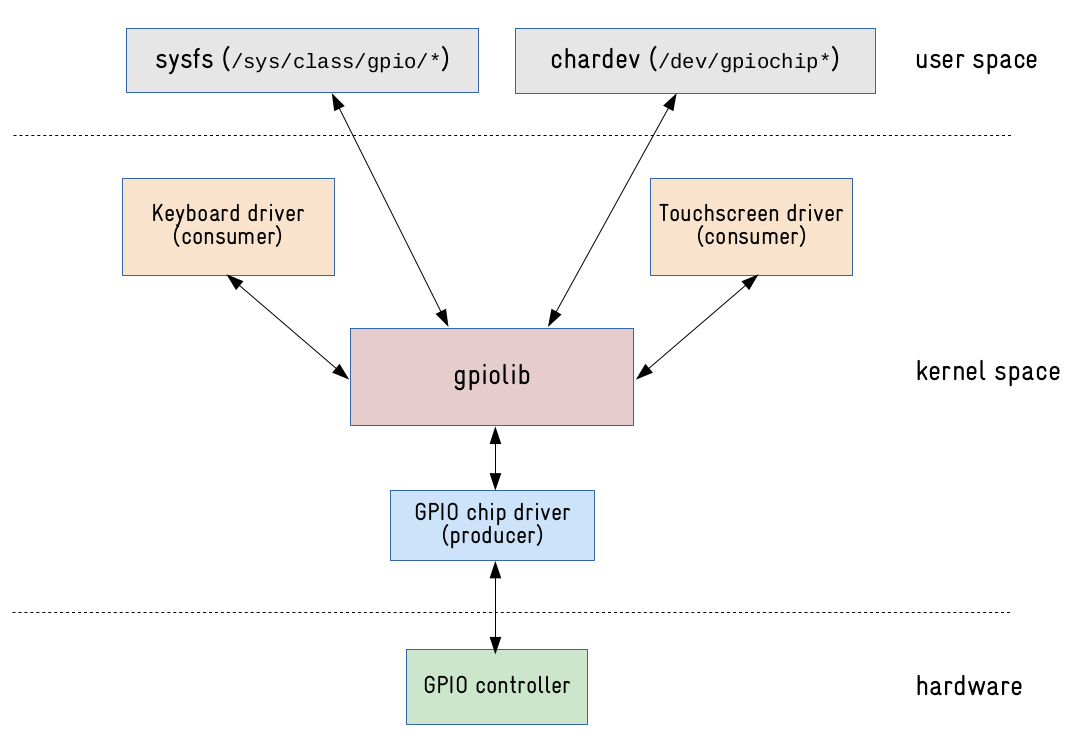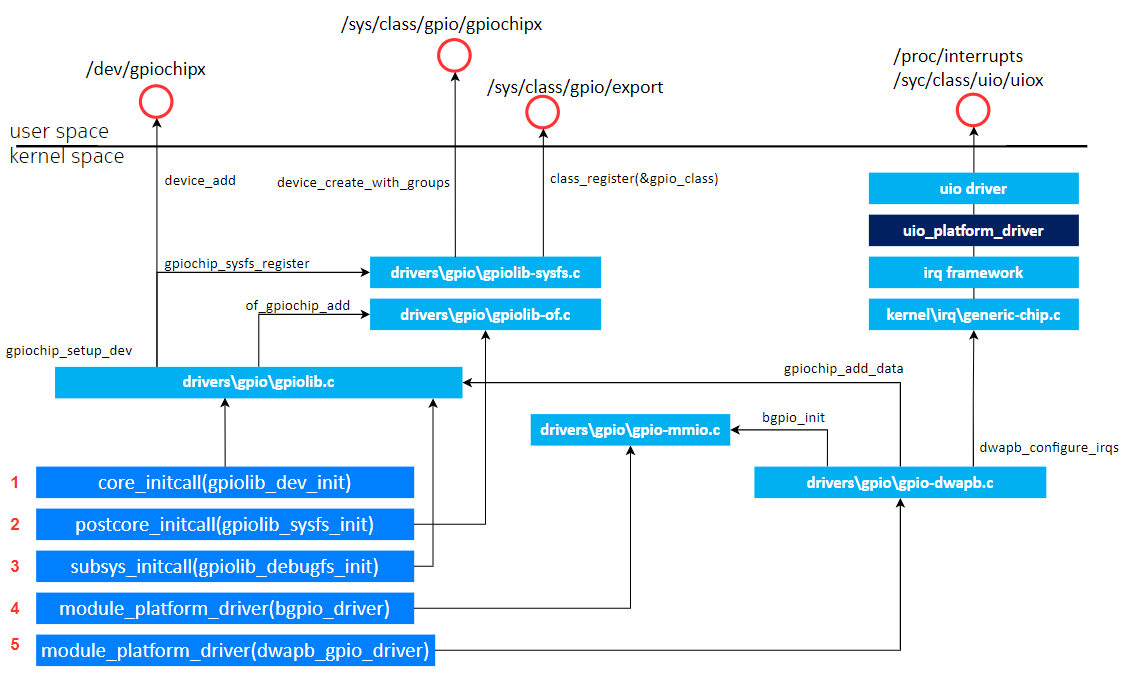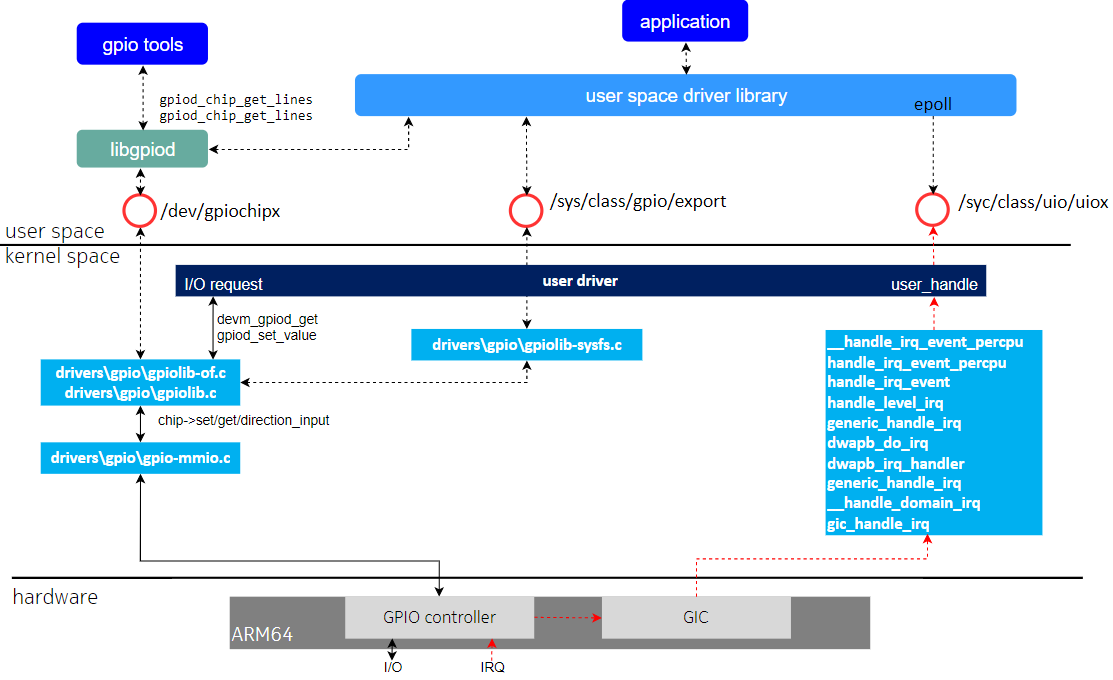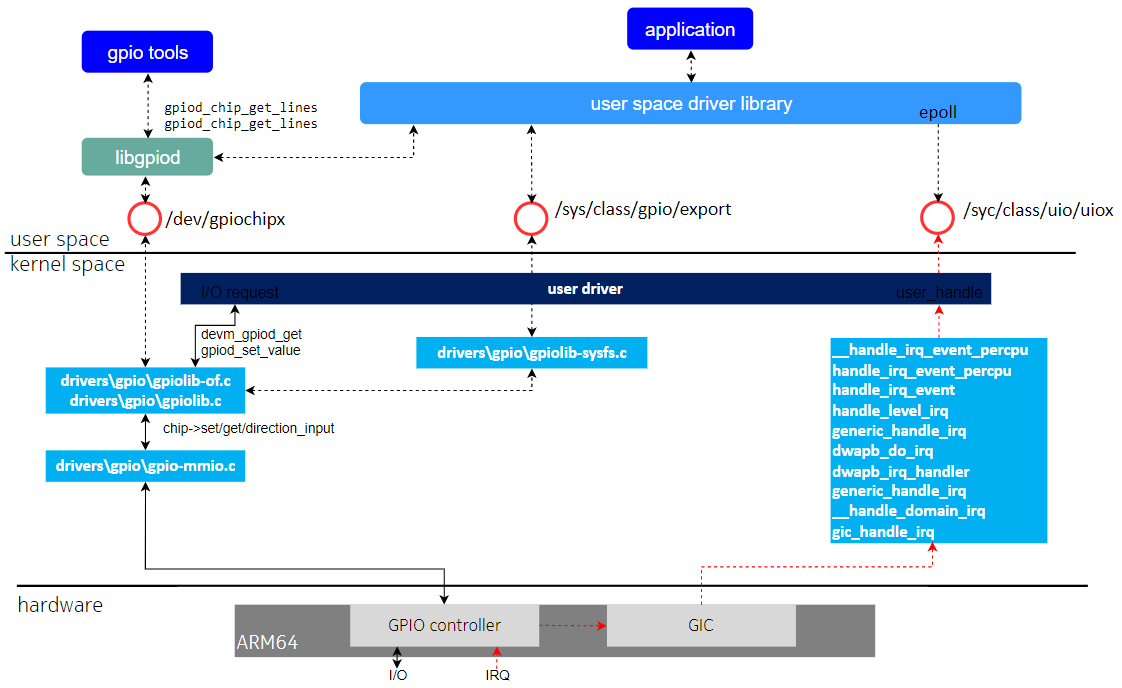- Overview
- GPIO init
- 内核态访问 GPIO
- 用户态访问 GPIO
- 参考文档
Overview
下图来自文章 Linux kernel GPIO user space interface ,可概括这篇文章的内容。本文介绍 Linux GPIO driver的初始化,用户态访问 GPIO 和内核态访问 GPIO。

GPIO init

DTS
gpio0: gpio@GPIO0_FULL_ADDR {
compatible = "snps,dw-apb-gpio";
reg = <GPIO0_REGS GPIO_REGS_SIZE>;
#address-cells = <1>;
#size-cells = <0>;
gpio0p0: gpio-controller@0 {
compatible = "snps,dw-apb-gpio-port";
gpio-controller;
#gpio-cells = <2>;
snps,nr-gpios = <8>;
snps,gpio-base = <0>;
reg = <0>;
interrupt-controller;
#interrupt-cells = <2>;
interrupt-parent = <&gic>;
interrupts = <GIC_SPI GPIO_0_SPI IRQ_TYPE_LEVEL_HIGH>;
};
};
core_initcall(gpiolib_dev_init)
gpiolib_dev_init
bus_register(&gpio_bus_type)
alloc_chrdev_region(&gpio_devt, 0, GPIO_DEV_MAX, "gpiochip")
gpiolib_initialized = true
gpiochip_setup_devs() //traverse gpio_devices
gpiochip_setup_dev(gdev)
cdev_add(&gdev->chrdev, gdev->dev.devt, 1)
device_add(&gdev->dev)
gpiochip_sysfs_register(gdev)
device_create_with_groups(&gpio_class, parent
postcore_initcall(gpiolib_sysfs_init)
class_register(&gpio_class)
gpiochip_sysfs_register
导出 sysfs 文件 /sys/class/gpio/export 和 /sys/class/gpio/unexport
subsys_initcall(gpiolib_debugfs_init)
debugfs_create_file("gpio", // create "/sys/kernel/debug/gpio"
module_platform_driver(bgpio_driver)
Generic driver for memory-mapped GPIO controllers.
module_platform_driver(dwapb_gpio_driver)
dwapb_gpio_probe
dwapb_gpio_add_port
bgpio_init
dwapb_configure_irqs(gpio, port, pp)
irq_domain_create_linear
irq_alloc_domain_generic_chips
irq_get_domain_generic_chip
irq_set_chained_handler_and_data or
devm_request_irq or irq_set_chained_handler_and_data
irq_create_mapping(gpio->domain, hwirq)
port->gc.to_irq = dwapb_gpio_to_irq
gpiochip_add_data(&port->gc, port)
gpiodev_add_to_list //add to gpio_devices
gpiochip_set_desc_names
gpiochip_irqchip_init_valid_mask
of_gpiochip_add
gpiochip_setup_dev
user drivers
UIO platform driver
uio_irq_platform_probe
uio_irq_parse
uio_register_device
builtin_platform_driver(gpio_clk_driver)
Gpio controlled clock implementation
module_platform_driver(mdio_gpio_driver)
GPIO based MDIO bitbang driver.
module_platform_driver(gpio_led_driver)
LEDs driver for GPIOs
user interface
Char device
~ # ls /dev/gpiochip* -l
crw-rw---- 1 root root 254, 0 Jan 1 1970 /dev/gpiochip0
crw-rw---- 1 root root 254, 1 Jan 1 1970 /dev/gpiochip1
crw-rw---- 1 root root 254, 2 Jan 1 1970 /dev/gpiochip2
sysfs
/sys/class/gpio # ls -l
--w------- 1 root root 4096 Dec 3 19:07 export
lrwxrwxrwx 1 root root 0 Dec 3 19:07 gpiochip0 -> ../../devices/platform/axi/4f200000.gpio/gpio/gpiochip0
lrwxrwxrwx 1 root root 0 Dec 3 19:07 gpiochip16 -> ../../devices/platform/axi/4f600000.gpio/gpio/gpiochip16
lrwxrwxrwx 1 root root 0 Dec 3 19:07 gpiochip8 -> ../../devices/platform/axi/4f400000.gpio/gpio/gpiochip8
--w------- 1 root root 4096 Dec 3 19:07 unexport
内核态访问 GPIO

用户态访问 GPIO

libgpiod
buildroot 选择 package libgpiod 和 gpio tools:

libgpiod - C library and tools for interacting with the linux GPIO character device (gpiod stands for GPIO device)
https://git.kernel.org/pub/scm/libs/libgpiod/libgpiod.git/
Since linux 4.8 the GPIO sysfs interface is deprecated. User space should use the character device instead. This library encapsulates the ioctl calls and data structures behind a straightforward API.
gpio tools
There are currently six command-line tools available:
-
gpiodetect - list all gpiochips present on the system, their names, labels and number of GPIO lines
-
gpioinfo - list all lines of specified gpiochips, their names, consumers, direction, active state and additional flags
-
gpioget - read values of specified GPIO lines
-
gpioset - set values of specified GPIO lines, potentially keep the lines exported and wait until timeout, user input or signal
-
gpiofind - find the gpiochip name and line offset given the line name
-
gpiomon - wait for events on GPIO lines, specify which events to watch, how many events to process before exiting or if the events should be reported to the console